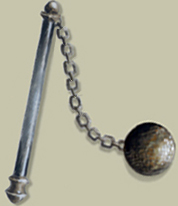|
Forging Guide: Page One
Introduction
The Forging System enables a character to craft weapon parts from
raw materials and then assemble the parts into combat-ready weapons.
Every weapon is constructed of two parts, a head or blade part and
a handle, hilt or haft part. Forging hammers, which are not functional
weapons but which have to be constructed in order for a character
to work metals in the forges, also adhere to this two part design.
The Forging Skill is actually comprised of six separate skills.
 Crafting
skill determines how well a character can fashion weapon parts by
shaping them on the grinder and also impacts the quality of each
completed item which is assembled using the vise. The weapon forging
skills determine how well a character shapes a weapon part at the
forge. Crafting
skill determines how well a character can fashion weapon parts by
shaping them on the grinder and also impacts the quality of each
completed item which is assembled using the vise. The weapon forging
skills determine how well a character shapes a weapon part at the
forge.
Successful production of parts and assembly of parts into complete
items is dependent upon a character's development of one or more
of these skills within the Forging System. Characters may only master
two skills from among all Artisan Skills which are available. However,
mastery of three forging system skills (Crafting, and two weapon
forging skills) will count as one skill within the Artisan Skill
system. This is because, in order to "master forging",
a character must first develop their Crafting skill and then also
develop one or two of the five weapon-group-specific forging skills.
Because the production of some weapons, such as the bastard sword,
will average two weapon-group forging skills, the Forging System
allows mastery of two forging skills in addition to the Crafting
skill.
There are multiple machines within forging workshops which allow
a character to progress through the weapon creation process. These
machines are:
- The Glyphs
- The Grinder
- The Forge
- The Polisher
- The Vise
Workshops
Public forging workshops will be present in every town. The number
of workshops in a particular town will depend primarily on the history,
culture and geography of the town.
Access to the workshops will be via a central supply shop. The
verb used to gain access to a public workshop is GO WORKSHOP,
at which point the clerk will charge 1,000 silver coins as a rental
fee for one hour of workshop time. If characters enter a workshop
in a group, only the leader is charged the rental fee. Supply shops
sell bronze bars as a practice material, tempering oil and magical
tempering oil, a type of wood block for hilts or hafts, and glyphs
for the parts of three weapons in each weapon-skill group. Glyphs
for forging-hammer heads and handles are not sold in the shops,
because these glyphs are permanently affixed to the workbench in
each workshop and are available free of charge. Each town's supply
shop sells one pair of glyphs for a weapon that is unique to that
supply shop.
NEXT
PAGE >>
|



 Crafting
skill determines how well a character can fashion weapon parts by
shaping them on the grinder and also impacts the quality of each
completed item which is assembled using the vise. The weapon forging
skills determine how well a character shapes a weapon part at the
forge.
Crafting
skill determines how well a character can fashion weapon parts by
shaping them on the grinder and also impacts the quality of each
completed item which is assembled using the vise. The weapon forging
skills determine how well a character shapes a weapon part at the
forge.